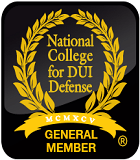
The California Highway Patrol (CHP) and various law enforcement agencies across California make thousands of DUI arrests annually. The arrest data indicates that law enforcement actively monitors drivers who may be under the influence of alcohol or drugs. Being arrested for DUI can be overwhelming, and a conviction can lead to serious, long-lasting consequences.
If this is your first DUI arrest, you should avoid handling the court case or dealing with the DMV on your own. Hiring an experienced DUI attorney is the best way to ensure you have proper defense, protect yourself, and help you get back to your normal life. At the Law Offices of Anna R. Yum, our San Diego DUI defense lawyers have the experience necessary to win these cases and will fight for your rights in court. Contact us today to get a favorable outcome for your case.
Free Consultation (619) 233-4433
Legal Definition of DUI in California
California’s DUI laws fall under Vehicle Code 23152 a and b:
- VC 23152(a) makes it illegal to drive under the influence of alcohol or drugs, no matter your blood alcohol level
- VC 23152(b) states that you can’t operate a vehicle if your blood alcohol content (BAC) is .08% or higher.
If you are arrested for DUI, you can face two separate misdemeanors. One for driving while impaired (VC 23152(a)) and another for having a BAC of 0.08% or more (VC 23152(b)).
Drugs and DUI Charges in California
According to California Vehicle Code 23152(f) VC, it’s illegal to drive if you’re under the influence of drugs. Vehicle Code 23152(f) includes any drug that can affect your driving skills.
This list includes illegal drugs such as:
- Heroin
- Methamphetamine
- Ecstasy
- LSD
- Cocaine
Even driving under the influence of prescription medications can result in a DUI charge. If a prescription drug affects your ability to drive safely, the legal consequences are similar to those for alcohol or illegal drugs.
Common prescription medications that can impair driving and lead to a DUI charge include:
- Opioid painkillers, for example, OxyContin
- Benzodiazepines, for example, Xanax
- Sleep aids, for example, Ambien
- Muscle relaxants, such as, Soma
- Stimulants, such as Adderall
- Antidepressants (e.g., Prozac, Zoloft)
You should carefully review the warning labels on prescription medications and consult your doctor or pharmacist about any potential side effects before driving.
California’s Zero Tolerance Law
The Zero Tolerance law under California’s VC 23136 makes it unlawful for motorists under the age of 21 to drive with any detectable alcohol in their system. If their Blood Alcohol Content (BAC) is 0.01% or more, they violate the law. VC 23136 is designed to lower the number of DUI-related accidents and deaths among young drivers by discouraging them from drinking before getting behind the wheel.
Also, if you’re on DUI probation, you can’t have any alcohol in your system while driving. This “zero tolerance” rule means that even a tiny amount of alcohol can get you a DUI charge and a violation of your probation. This rule is tougher than the usual limit of 0.08% BAC for drivers who aren’t on probation.
Violating this rule or refusing a chemical test after an arrest can lead to further penalties for probation violation, in addition to new DUI charges.
Commercial Drivers DUI
A commercial DUI refers to operating a commercial vehicle in California with a BAC of 0.04% or more.
The 0.04% BAC limit is specific to commercial vehicles. California’s standard legal limit of 0.08% applies to non-commercial vehicles.
California follows U.S. federal rules regarding suspending CDL licenses due to DUI offenses. According to federal regulations, if a driver operates a commercial vehicle with a blood alcohol level of .04 or higher, or a non-commercial vehicle at .08 or higher, their CDL is suspended for one year. The driver loses their CDL regardless of whether the DUI happened in a commercial or non-commercial vehicle.
If a driver refuses a sobriety test, they face a one-year suspension of their CDL. Drivers of hazardous materials who receive a DUI or refuse a test face a three-year suspension.
Under 49 Code of Federal Regulations 383.51 and California law, a second DUI leads to the permanent loss of the CDL.
DUI Investigations
The DUI process starts with an investigation, usually following a traffic stop by the police. If officers suspect you’ve been drinking or using drugs, they could request you to complete a Preliminary Alcohol Screening and field sobriety tests. When the officer finds probable cause that you had been operating a vehicle while impaired by alcohol or drugs, they will arrest you.
Once you’ve been arrested for DUI, you must take a breath or blood test to check if your BAC is 0.08 percent or higher. If drug use is suspected, you’ll need to undergo a blood test and, in some cases, a urine test.
Refusing a chemical test leads to a “refusal” accusation, resulting in extra DUI penalties like a license suspension for one year and two days in jail.
The court can grant you temporary freedom after posting bail. It can also release you on your Own Recognizance, allowing you to go home without paying anything if you promise the court to attend future court dates. The officer will then complete their report and send it to the prosecutor, who will decide whether to file charges.
The Department of Motor Vehicle (DMV) Case
Soon after you have been arrested, the officer will inform you that the DMV will suspend your license within 30 days. They will give you a temporary driver’s license that you can use until the DMV suspension starts.
You have ten days from your arrest to ask for a preliminary hearing with the Department of Motor Vehicles. If you request a hearing, you can keep driving, and your license will not be suspended until you have the results from the hearing. If you don’t ask for a hearing, your suspension will kick in on the thirtieth day.
The DMV hearing is a mini-trial at a DMV office where you and your lawyer can contest the license suspension.
When you win the DMV hearing, your license won’t be suspended. When you lose, the DMV can suspend your driver’s license for anywhere between four months and 3 years, based on:
- How many previous DUI convictions you have
- Whether you refused or took the chemical DUI test
DUI Penalties
The severity of the DUI penalties varies based on factors such as your prior DUI history, blood alcohol content, and whether an accident caused any injuries. While most DUI charges are misdemeanors, some can be classified as felonies. Below is what you should expect if you are facing DUI charges:
First DUI Offense
Penalties for a first offense misdemeanor DUI may include:
- Informal probation for three to five years
- Enrollment in a DUI education program lasting 3 to 9 months
- Fines between $390 and $1,000
- Jail time ranging from 0 to 6 months
- A license suspension of 6 to 10 months, which can often be converted to a restricted license allowing you to drive to work, school, and DUI classes
Additional penalties may apply at the judge’s discretion. You should hire a DUI defense attorney within 10 days of your arrest to request a DMV hearing, which will pause your license suspension until the hearing concludes. If you choose not to hire an attorney, you must still request the hearing to avoid losing your license.
Second DUI Offense
If you are convicted of a second DUI misdemeanor within 10 years, you could face various penalties, including:
- A minimum of 96 hours and up to 1 year in jail
- A 2-year suspension of their driver’s license, with a possibility of a restricted license after 1 year
- 18 to 30 months of DUI education
The judge may also impose additional penalties at their discretion.
Third DUI Offense
A third DUI conviction within 10 years typically escalates to a felony, resulting in possible consequences such as:
- A minimum of 120 days and up to 1 year in jail
- A 3-year revocation of the driver’s license, with a chance for a restricted license after 18 months
- 30 months of required DUI education
After a third DUI conviction in 10 years, you might be classified as a “habitual traffic offender”. You could be required to install an interlock ignition device in your vehicle, which prevents the engine from starting until an alcohol-free breath sample is taken.
Additionally, any future related offenses could automatically be classified as felonies.
DUI with Injury
When you face charges for DUI with injury, you might be charged with either a felony or a misdemeanor. The classification depends on the arrest circumstances and your criminal history.
If convicted of misdemeanor DUI resulting in injury, you could face:
- 3 to 5 years of probation
- Fines ranging from $390 to $5,000
- 5 days to 1 year in jail
- A driver’s license suspension for 1 to 3 years
- A required DUI education program lasting 3, 18, or 30 months
- Restitution to the injured party
If convicted of felony DUI causing injury, the penalties may include:
- A state prison sentence of 16 months to 10 years, with a possible consecutive sentence of 1 to 6 years
- Fines from $1,015 to $5,000
- A “strike” on the criminal record
- 3 years classified as a Habitual Traffic Offender (HTO)
- Mandatory DUI education for 18 or 30 months
- Restitution to all injured parties
For felony DUI without injury, penalties may include:
- 16 months to 3 years in state prison
- $1,000 in fines
- a 4-year driver’s license revocation
- designation as a Habitual Traffic Offender
- Compulsory installation of an ignition interlock device
Probation
Many view probation as a more favorable option than serving time in prison. However, probation comes with certain conditions. If you are sentenced to probation for a DUI, you cannot drive with any alcohol in your system.
Below are some standard conditions of probation, but judges may impose additional ones based on your specific case. They can include:
- Joining and attending Alcoholics Anonymous or Narcotics Anonymous
- Paying restitution for any injuries or property damage caused
- Enrolling in a drunk driving impact program offered by Mothers Against Drunk Driving
- Installing an Ignition Interlock Device, which is mandatory in some California counties and discretionary in others
Aggravating Factors in DUI Cases
Certain factors can lead to harsher DUI sentences in California, known as aggravating factors. These include:
- A blood alcohol content over 0.15%
- Being at fault in an accident
- Refusing to take a chemical test
- Having a child under 14 in the vehicle during the offense
- Speeding
- Being underage at the time of the arrest
While these are common aggravating factors, there are no fixed rules for increasing penalties, and judges may consider other factors when determining if a DUI case is aggravated.
Collateral Consequences of a DUI/DWI Conviction
The consequences of a DUI conviction differ for each person and can vary based on whether the charge is a misdemeanor or a felony. Generally, a DUI conviction can:
- Complicate future employment opportunities
- Make finding affordable housing challenging
- Hinder enrollment in local colleges or universities
- Lead to significant financial difficulties
Can You Receive a Restricted Hardship License After a DUI Conviction?
Losing the ability to drive to work or school due to a DUI charge can be tough for many drivers. California law offers a solution through a restricted hardship license, allowing you to drive to work or school during suspension. To obtain this license, you need to apply to the DMV and meet these requirements:
- You must have a vehicle for valid purposes, like school or work
- The DMV must find that other transportation options are insufficient for your case
- You must not have refused any other chemical test, which would disqualify you from a restricted hardship license.
- You must not have refused the preliminary alcohol screening (PAS)
Even if you qualify, you must complete a 30-day suspension before receiving the restricted hardship license, during which you cannot drive. Underage drivers can regain their driving privileges after a DMV suspension or revocation for a VC 23136 violation by:
- Paying a $100 reissue fee
- Maintaining proof of financial responsibility for three years
- Filing proof of financial responsibility (SR-22)
Ignition Interlock Device After a DUI Charge
Ignition interlock devices (IIDs) are small breathalyzers installed in your vehicle’s dashboard. They prevent your car from starting until you provide a breath sample free of alcohol.
A judge may require the installation of an IID in California for several reasons, including:
- A first DUI offense under Vehicle Code 23152(a) VC, especially if the blood alcohol concentration (BAC) is .015% or higher
- A first offense of refusing a chemical blood or breath test
- A first DUI offense under Vehicle Code 23152(b) VC with a BAC of 0.08% or higher
- Violations of Vehicle Code 14601 VC related to a suspended license due to DUI
Judges will also mandate IID installation for:
- Repeat DUI convictions
- DUI offenses causing injury under Vehicle Code 23153 VC
For first-time DUI offenders, the IID requirement typically lasts for 6 months after conviction. The IID period is usually 4 months if there’s no DUI conviction.
For repeat DUI offenses, California law requires:
- One year of IID installation after a second DUI conviction
- Three years following a fourth or subsequent conviction
- Two years after a third DUI conviction
If convicted of a second DUI causing injury, the IID must be installed for two years (three years for a third conviction). If the DMV finds the defendant liable without a DUI conviction, the IID requirement is typically one year, regardless of whether it’s a second or third offense.
Ways to Challenge DUI Charges
There are many legal defenses you can use to defend against DUI charges:
Driving Poorly Does Not Always Indicate DUI
You can contest DUI charges by claiming that your erratic or poor driving wasn’t due to alcohol or drugs. This argument is particularly effective against Vehicle Code 23152(a) VC accusations.
Prosecutors often focus on your driving behavior, with the arresting officer stating that your driving resembled that of someone under the influence, because you were either speeding or weaving.
Your defense attorney can counter this by highlighting instances where you drove safely and correctly. They can bring in the officer to acknowledge that sober individuals commit most traffic violations and that driving patterns do not reliably indicate intoxication. According to the National Highway Traffic Safety Administration, driving cues cannot accurately predict impaired driving.
Physical Symptoms Don’t Always Mean DUI
Your physical appearance can significantly impact a DUI investigation. The arresting officer may claim you were “under the influence” based on signs like red, watery eyes, a flushed face, slurred speech, a strong alcohol odor, or an unsteady gait. These “objective signs” are listed on a DUI arrest form used by various law enforcement agencies, allowing officers to check off symptoms without much explanation.
Your attorney can defend you by providing innocent explanations for these signs. Conditions such as allergies, fatigue, a cold, or eye irritation can all cause red eyes.
The Field Sobriety Tests Are Inaccurate
DUI prosecutions rely heavily on Field Sobriety Tests (FSTs), which a prosecutor and the arresting officer evaluate. These individuals often assert that poor performance on FSTs indicates drunk driving.
However, your attorney can clarify that factors such as your natural coordination, fatigue, nerves, flat feet, clothing, and several other issues can affect your balance and coordination during these tests.
Your attorney can also question the reliability of FSTs.
“Mouth Alcohol” Inflated Your BAC Result
Before conducting a DUI breath test, an officer must observe you for 15 minutes to ensure you don’t consume any alcohol-containing substances, including drinks, mouthwash, or medicines (like cough syrup).
The officer must also ensure you don’t burp, belch, or regurgitate, as doing this could release alcohol from your stomach into your mouth, creating “residual mouth alcohol.”
The accuracy of breath testing equipment relies on your deep lung air. If you have alcohol in your mouth when you blow into the device, it can mix with your lung air, resulting in a falsely high blood alcohol content (BAC) reading. Thus, mouth alcohol serves as a strong defense against charges of having a BAC of 0.08 or higher under Vehicle Code 23152(b) VC.
The Officer Failed to Conduct a 15-Minute Observation
Police must observe you for 15 minutes before administering a DUI breath test. However, many officers focus on paperwork or setting up the breath test machine instead. This failure to conduct the observation properly raises doubts about your breath test results and the overall DUI investigation.
The Officer Did Not Follow Title 17 Regulations
California Code of Regulations Title 17 outlines the requirements for conducting DUI blood and breath tests. These requirements include:
- A 15-minute observation period
- Correct test administration
- Properly trained personnel administering the tests
- Proper collection, handling, and storage of blood (or urine) samples
- Regular calibration and maintenance of testing equipment,
Your test results might be compromised if officers do not adhere strictly to Title 17 regulations. Ignoring even one regulation can jeopardize the entire DUI investigation.
Your BAC Was “On the Rise”
“Rising blood alcohol” is a valid DUI defense. While drinking before driving isn’t illegal, being impaired while driving is. Your BAC increases steadily until it peaks, typically taking about 50 minutes to reach its highest level, though it can take up to two or three hours depending on various factors. If your blood alcohol level was still rising when you were stopped, the results of your chemical test might be inaccurate. Your BAC could have exceeded the legal limit during the prolonged DUI investigation, but what matters is your BAC at the time you were driving.
You Have a Condition That Can Cause False Positives
Diabetes, hypoglycemia, or a high-protein diet can elevate your BAC. Typically, our bodies use carbohydrates for energy. Still, in certain situations, like fasting, following a high-protein or low-carb diet, or having diabetes, the body turns to stored fats for fuel.
While burning fat, the liver produces toxic byproducts known as “ketones,” which resemble isopropyl alcohol in solvents like acetone. Some ketones exit the body through breath. Unfortunately, breath testing devices may misinterpret ketones, as they can’t always differentiate between ethyl alcohol and isopropyl alcohol, the latter being present in alcoholic beverages. This misinterpretation can result in an inaccurately high BAC reading on a breath test.
Find a San Diego DUI Defense Attorney Near Me
In California, a DUI conviction for alcohol or drugs comes with serious penalties, such as fines, a suspended license, potential jail time, and in some cases, mandatory treatment programs.
If you face drunk driving charges in San Diego, you can contact our attorneys at the Law Offices of Anna R. Yum. We have a wealth of experience defending clients in drunk driving cases. We offer knowledgeable and legal representation that can help reduce or dismiss your charges. Call us today at 619-493-3461 to speak to one of our DUI attorneys.











